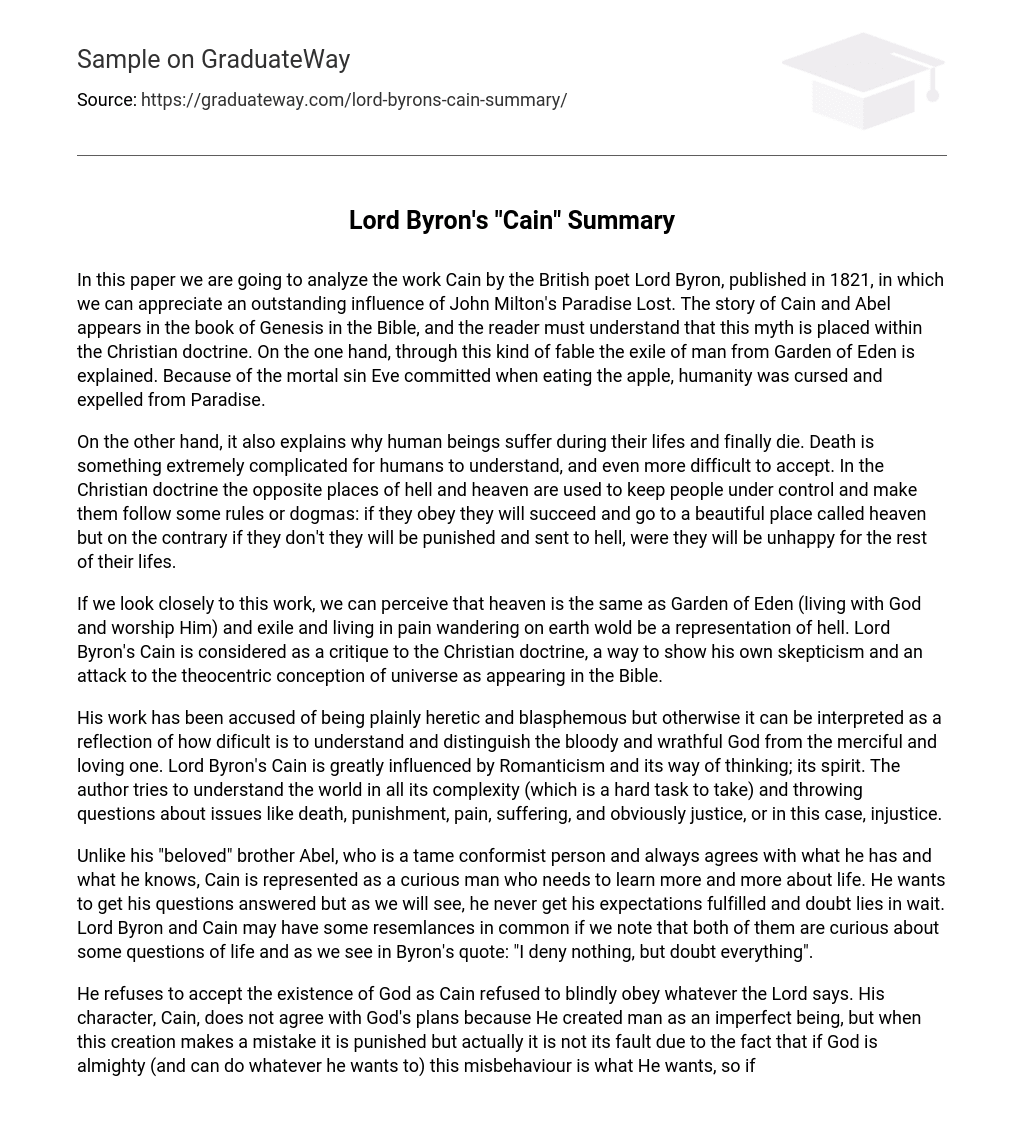In this paper we are going to analyze the work Cain by the British poet Lord Byron, published in 1821, in which we can appreciate an outstanding influence of John Milton’s Paradise Lost. The story of Cain and Abel appears in the book of Genesis in the Bible, and the reader must understand that this myth is placed within the Christian doctrine. On the one hand, through this kind of fable the exile of man from Garden of Eden is explained. Because of the mortal sin Eve committed when eating the apple, humanity was cursed and expelled from Paradise.
On the other hand, it also explains why human beings suffer during their lifes and finally die. Death is something extremely complicated for humans to understand, and even more difficult to accept. In the Christian doctrine the opposite places of hell and heaven are used to keep people under control and make them follow some rules or dogmas: if they obey they will succeed and go to a beautiful place called heaven but on the contrary if they don’t they will be punished and sent to hell, were they will be unhappy for the rest of their lifes.
If we look closely to this work, we can perceive that heaven is the same as Garden of Eden (living with God and worship Him) and exile and living in pain wandering on earth wold be a representation of hell. Lord Byron’s Cain is considered as a critique to the Christian doctrine, a way to show his own skepticism and an attack to the theocentric conception of universe as appearing in the Bible.
His work has been accused of being plainly heretic and blasphemous but otherwise it can be interpreted as a reflection of how dificult is to understand and distinguish the bloody and wrathful God from the merciful and loving one. Lord Byron’s Cain is greatly influenced by Romanticism and its way of thinking; its spirit. The author tries to understand the world in all its complexity (which is a hard task to take) and throwing questions about issues like death, punishment, pain, suffering, and obviously justice, or in this case, injustice.
Unlike his “beloved” brother Abel, who is a tame conformist person and always agrees with what he has and what he knows, Cain is represented as a curious man who needs to learn more and more about life. He wants to get his questions answered but as we will see, he never get his expectations fulfilled and doubt lies in wait. Lord Byron and Cain may have some resemlances in common if we note that both of them are curious about some questions of life and as we see in Byron’s quote: “I deny nothing, but doubt everything”.
He refuses to accept the existence of God as Cain refused to blindly obey whatever the Lord says. His character, Cain, does not agree with God’s plans because He created man as an imperfect being, but when this creation makes a mistake it is punished but actually it is not its fault due to the fact that if God is almighty (and can do whatever he wants to) this misbehaviour is what He wants, so if He get angry or disappointed when it happens then the whole situations seems to be contradictory for a rational being as Lord Byron, or in this case Cain.
Another famous quote pronounced by Lord Byron is: “there’s naught, no doubt, so much the spirit calms as rum and true religion”. In this affirmation he makes clear that (as rum) religion is an ideal method to putt all your problems out, to keep them away from you. Religion is seen as a way to avoid making questions about life, pretending you already have every single answer when you really do not, and that is part of his critic view.
Moving on with the story of Cain, Lucifer appears in scene bringing doubt and jealousy with him. With his offer of knowledge he confuses Cain and it is guilty for some of his actions. In a fragment of the work, the Fallen Angel mentions another beings who lived on earth before man did, and this was heretic and blasphemous at that time because it was against what the Bible says, God created everything on Earth and never said a word about other creatures before, and that was heretic (see Genesis 1. “In the beginning God created the heaven and the earth” /Genesis 1. 10 “And God said, Let us make man in our image, after our likeness”).
With the words of Lucifer who tells Cain to trust his own mind,we can observe a Romantic influence so different from what religion is about: do what I, in the name of a superior being, I’m telling you (“Make sure you are doing what Gods wants you to do… then do it with all your strenght”, George Washington).





